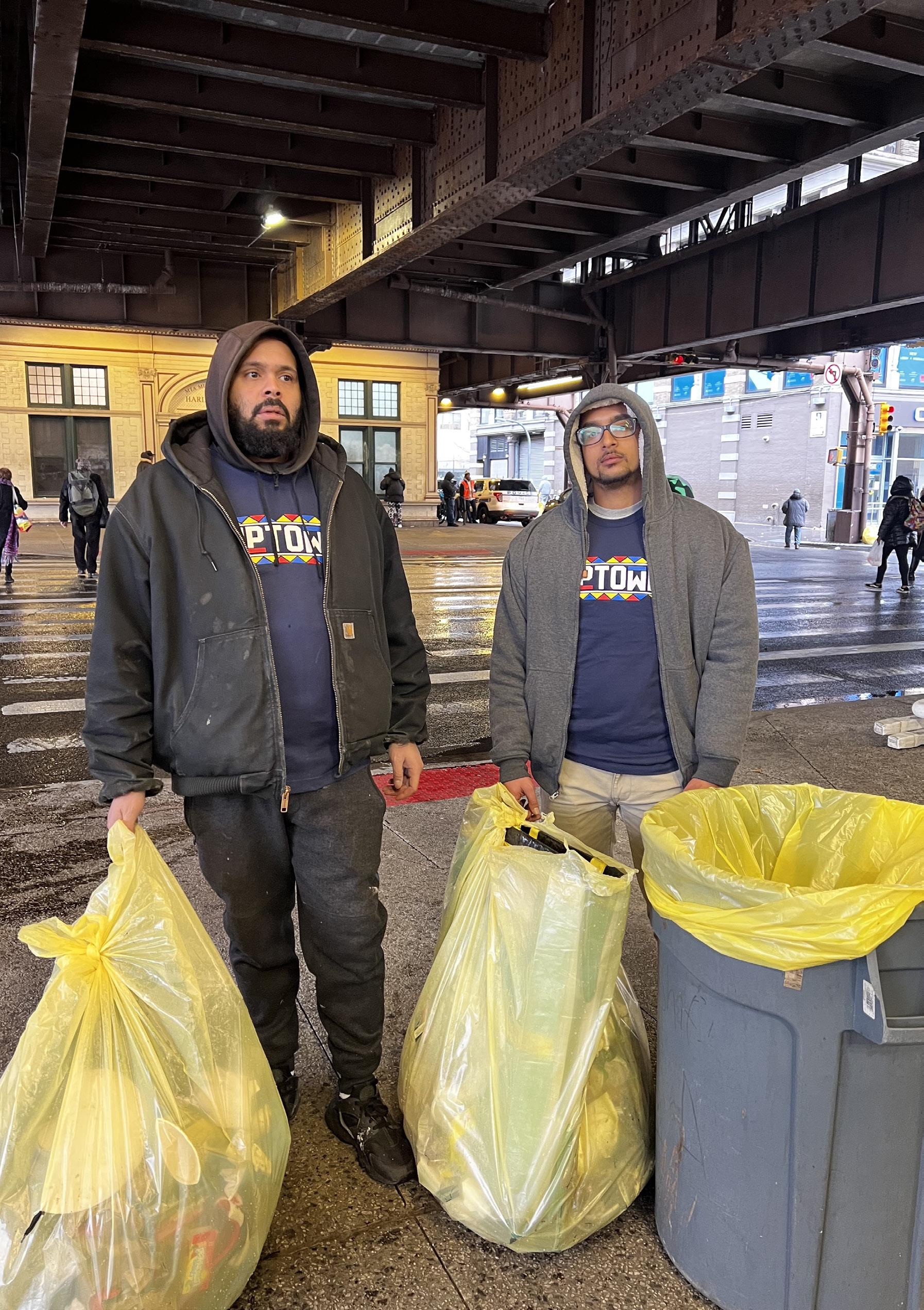
3 minute read
Manhattan DA gun violence prevention fund keeps East Harlem hub clean
By TANDY LAU Amsterdam News Staff, Report for America Corps Member
One man’s trash is another man’s gun violence prevention initiative. Uptown Grand Central recently collected its 1,000th garbage bag, a major milestone for the East Harlem nonprofit’s efforts to clean up outside the Metro-North Railroad station at 125th Street and Park.
The area serves as a first impression of not only Harlem, but the entire “Big Apple” for newly arrived train passengers from Connecticut and the rest of New York. Workers pick up trash ranging from fastfood wrappers to injection needles and human waste.
There are also high hopes that the program will not only clean up East Harlem, but discourage shootings in the majority Black and brown neighborhood. Uptown Grand Central was one of 10 initiatives awarded $20,000 by the Manhattan District Attorney’s Office to prevent youth gun violence last August.
“Community-based organizations are at the heart of enhancing public safety in our neighborhoods,” said Manhattan D.A. Alvin Bragg over email. “As part of our comprehensive gun violence strategy, we are focused on prevention efforts to keep young people engaged through meaningful programming, and Uptown Grand Central is an exemplary model of how this approach can make a significant impact.
“It takes real partnership and collaboration to deliver the safe streets that everyone deserves, and we are going to continue to make these types of investments to prevent violence from occurring in the first place.”
Last month, a 42-year-old man was fatally shot two blocks from the train station. Five gun-related incidents have been recorded so far this year by the 25th Police Precinct, which encompasses the area. According to the Manhattan D.A.’s Office, beautifying shooting “hotspots” and providing employment for community members are worhtwhile alternativeto-policing methods for gun violence prevention and a key objective for the $20,000 award.
Uptown Grand Central stems from efforts by local businessowners to bring back the commerce lost in East Harlem due to unkempt streets. Initially, the consortium—known as the New Harlem East Merchants Association (NHEMA)—contracted with outside clean-up crews. But in 2016, they launched the Uptown Grand Central team, which is easily identifiable by the bright yellow garbage bags that workers carry. The area outside the Metro-North station now comes alive through a weekly farm- make $20 an hour and the award covers roughly a month’s worth of pay. The nonprofit will continue to fundraise to keep up with wages.
“It’s great to be able to make a good, decent amount of money at $20 an hour rather than $15,” said worker Allen Rogers. “I don't know how people feed their family and put a smile on every day to go out there. I’m happy to be just picking up trash and cleaning your neighborhood and my neighborhood for $20 an hour.”
The median annual household income in East Harlem was $34,060 in 2019, according to the NYU Furman Center. That’s just slightly north of $16 an hour wage in a standard, five-day workweek.
To be clear, every dollar made by the Uptown Grand Central cleanup crew is hard-earned. Rogers and his colleagues Tyre Ramos and Jason McDavid were out working this past Tuesday, Feb. 28, despite the recent snowfall. They shared apprehensions about collecting used heroin needles and recalled frequently engaging with local drug users, and not every interaction has been positive. The country’s first safe injection site OnPoint NYC is located across the street. But McDavid, who said he’s known as the community’s “Rastaman,” welcomed the opportunity to chat.
“This job makes me be more social with people, more ready to make peace with people, more ready to converse with people,” he said. “Let me see what you are about, instead of being quick to jump on the ego, aggression, or a high temper. [It’s] made me more vigilant, more observant, [and] more aware of certain stuff around here.”
Regardless, a job collecting garbage is never easy. When the cleanup crew was asked about the grossest thing they’ve picked up, Rogers quickly answered. Without hesitation, he said human feces. Ramos took a second longer to think.
“Dead rats,” he finally says. “They’re chopped-up rats.” ers market, wide-scale murals, and colorful overhead lights.
Director Carey King told the Amsterdam News that Bragg’s funding goes entirely to paying the workers above the minimum wage. They
Tandy Lau is a Report for America corps member and writes about public safety for the Amsterdam News. Your donation to match our RFA grant helps keep him writing stories like this one; please consider making a tax-deductible gift of any amount today by visiting https://bit. ly/amnews1.










